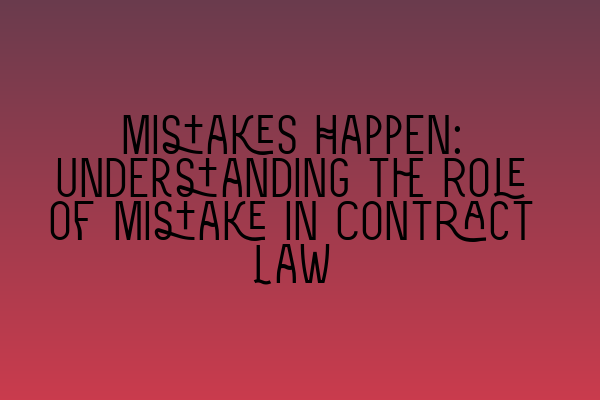Mistakes Happen: Understanding the Role of Mistake in Contract Law
When it comes to contracts, mistakes can happen. Whether it’s a simple typo or a misunderstanding of terms, the role of mistake in contract law is an important aspect to consider. In this article, we will dive deep into the concept of mistake, its implications, and how it affects contractual agreements.
Before we delve into the various types of mistakes that can occur in contracts, let’s first understand the fundamental principle of contract law. A contract is a legally binding agreement between two or more parties that establishes their rights and obligations. It creates a framework within which both parties are expected to fulfill their respective promises.
However, it’s essential to recognize that mistakes can occur during the process of creating a contract. These mistakes can have significant consequences and may even render the contract unenforceable. Therefore, it’s crucial for solicitors and individuals involved in contract law to have a comprehensive understanding of the role of mistake.
There are three main types of mistakes in contract law: mutual mistake, unilateral mistake, and mistake by misrepresentation. Let’s explore each of them in more detail:
1. Mutual Mistake:
A mutual mistake occurs when both parties to the contract are mistaken about an essential aspect of the agreement. This mistake must pertain to a basic assumption on which the contract was made, and it must significantly affect the agreed-upon exchange of promises. In such cases, the contract is voidable by either party, as the true intentions of both parties are not aligned.
For example, if Party A agrees to sell a rare antique vase to Party B, mistakenly believing it to be a genuine artifact when, in fact, it is a replica, a mutual mistake has occurred. Party B can choose to avoid the contract since the initial assumption of the authenticity of the vase was incorrect.
2. Unilateral Mistake:
Unlike mutual mistake, a unilateral mistake involves only one party being mistaken about a fundamental aspect of the contract. This mistake may arise from a typographical error, a misunderstanding of terms, or even a lack of knowledge about certain facts. Generally, a unilateral mistake does not render a contract voidable unless certain conditions are met.
To successfully avoid a contract due to a unilateral mistake, the mistaken party must show that they made a substantial error, and the other party was aware of or caused that mistake. Additionally, the mistaken party must also demonstrate that enforcing the contract would be unconscionable or inequitable.
For instance, if Party A offers to sell a car for $10,000, mistakenly believing it to be in perfect condition while Party B is aware of undisclosed defects in the car, Party A may have grounds to avoid the contract.
3. Mistake by Misrepresentation:
Mistake by misrepresentation occurs when a party is induced to enter into a contract based on a false statement made by the other party. This false statement can be an innocent misrepresentation, negligent misrepresentation, or fraudulent misrepresentation.
In the case of innocent misrepresentation, the party making the statement genuinely believes it to be true, but it later proves to be false. Negligent misrepresentation occurs when a party carelessly makes a false statement without reasonable grounds for believing it to be true. Finally, fraudulent misrepresentation involves a deliberate and intentional falsehood.
If a contract is entered into based on a mistake by misrepresentation, the innocent party may have the right to rescind the contract, seek damages, or obtain other appropriate relief.
Understanding the various types of mistakes in contract law is essential for solicitors and legal professionals involved in drafting, reviewing, and enforcing contracts. By grasping the intricacies of mistake, they can better advise their clients on the potential pitfalls and consequences of contractual agreements.
In conclusion, mistakes can indeed happen in contract law. Whether it’s a mutual mistake, a unilateral mistake, or a mistake by misrepresentation, understanding the role of mistake is crucial for all parties involved. By recognizing and addressing mistakes promptly, solicitors and individuals can help ensure the validity and enforceability of contracts.
Interested in learning more about contract law and preparing for the SQE exams? Check out these related articles:
– [SQE 1 Practice Exam Questions](https://fqps.co.uk/sqe/sqe1-preparation/mcq-practice-quiz)
– [SQE 1 Practice Mocks FLK1 FLK2](https://fqps.co.uk/sqe/sqe1-preparation/practice-mocks-quiz)
– [SQE 2 Preparation Courses](https://fqps.co.uk/sqe/sqe2-preparation)
– [SQE 1 Preparation Courses](https://fqps.co.uk/sqe/sqe1-preparation)
– [SRA SQE Exam Dates](https://fqps.co.uk/sqe/sqe1-sqe2-exam-dates)
By staying informed and constantly enhancing your knowledge, you can excel in the complex and ever-evolving field of contract law.
